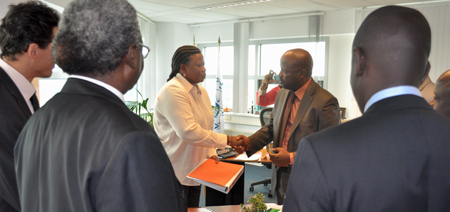 |
| Malian Minister of Justice, H.E. Malick Coulibaly and ICC prosecutor Fatou Bensouda |
On July 18, 2012, the Government of Mali referred “the situation in Mali since January 2012” to the Office of the Prosecutor (OTP). Mali is a state party to the ICC, as it ratified the Rome Statute on August 16, 2000. A delegation from Mali led by Minister of Justice H.E. Malick Coulibaly transmitted a letter and supporting documentations to Prosecutor Fatou Bensouda, and the Government of Mali claimed that Malian courts are unable to prosecute or try the perpetrators.
The referral by the Government of Mali is the fourth referral by an African State Party to the ICC. The Malian Cabinet decided on May 30, 2012 to refer the situation to the ICC, and the ECOWAS Contact Group of Mali requested the ICC to investigate the situation on July 7, 2012.
Violence erupted in Mali on January 17, 2012, and the Prosecutor has been closely monitoring the situation in Mali. There are reported instances of killings, abductions, rapes, conscription of children, and the deliberate destruction of the shrines of Muslim saints in the city of Timbuktu. The OTP is immediately launching a preliminary examination of the situation in order to assess whether the Rome Statute criteria for opening an investigation are fulfilled.
A Look into the Situation in Mali
Mali, a former French colony, was once considered one of the most stable countries and as a democratic model in West Africa. Mali has a long history of Tuareg secessionist rebellions and Islamist separatist groups.
On January 17, 2012 the National Movement for the Liberation of Azawad (MNLA), which is predominantly Tuareg, launched rebellion attacks on Ménaka in North Mali, resulting in mass violence and many civilian deaths. The situation in Mali is linked to the downfall of Muammar el-Quadaffi, in Libya. The Tuaregs fought for Colonel Qadaffi when he struggled to stay in power, and after his death a flood of weapons bolstered the Tuareg rebels in Mali.
On March 22, 2012 the Army overthrew the elected government of President Amadou Toumani Touré and Dioncounda Traoré was sworn in as interim president. The Army accused the elected government of not doing enough against the MNLA and the Islamist groups
Meanwhile, Tuareg rebels and Islamist groups seized much of northern Mali, including the historic city of Timbuktu. On April 6, 2012, the MNLA proclaimed the independent state of Azaward in Northern Mali.
In June and July, the Islamist group Ansar Dine destroyed religious shrines in Timbuktu, provoking international outrage. On July 1, 2012 Prosecutor Bensouda condemned the campaign to destroy religious shrines and said that “Those who are destroying religious buildings in Timbuktu should do so in full knowledge that they will be held accountable and justice will prevail.”


No comments:
Post a Comment